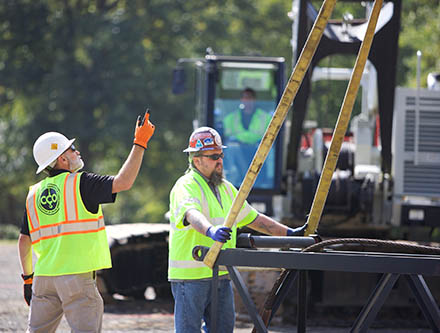The vital role of CCO Signalperson certification

August 27, 2024—In the construction industry, the safety of operations—particularly those involving cranes—hinges significantly on the expertise of signalpersons. They serve as the eyes and ears of crane operators, guiding them in environments where visibility is compromised or obstructed. Recognizing their pivotal role, regulatory bodies like OSHA and ASME have heightened the qualifications required for signalpersons.
OSHA and ASME
OSHA mandates that a signalperson must be qualified, especially when the crane’s point of operation is not fully visible to the operator, or when the operator’s view is obstructed. The signalperson must be qualified through an oral or written test and through a practical test. The qualification must be well-documented and specify the types of signaling the individual is certified to perform.
ASME B30.5-2021 has further delineated the responsibilities of signalpersons, encompassing the direction of crane and load movement, using standard hand or voice signals, and ensuring that special signals do not conflict with standard ones. The standard also emphasizes the importance of avoiding commands that could result in loads moving over people. It is anticipated that ASME will work to define signalperson qualifications in future versions of B30.5, and the requirements would likely also contain a written (or audible) and a practical exam.
Employer Benefits
Employers investing in signalperson certification rather than mere qualification yield significant benefits. Certification reduces liability by ensuring that signalpersons meet a national standard, which is critical in mitigating risks associated with crane operations.
Using certified personnel assures that the signalpersons possess a comprehensive understanding of hand signals, equipment operation limitations, and regulatory requirements, which is paramount in maintaining job site safety. Most importantly, national certifications are legally defensible and transportable, meaning an employer can rely on the certification and not have to retest or requalify the signalperson.
While many employers accept a qualification card issued by previous employers, OSHA states that qualifications are not portable. National certification is a higher standard because it is by a third party and ensures test integrity, unlike employer qualifications.
Prioritizing Certification
CCO is renowned for setting the gold standard in the certification of load handling equipment professionals, including signalpersons. As the nation’s largest certifier for those that work in and around load handling equipment, CCO’s reputation for excellence is unmatched. The certification process, which encompasses both written and practical tests, is rigorously designed by industry experts to validate a signalperson’s proficiency comprehensively. This ensures that the certification not only meets but exceeds all OSHA and ASME requirements, providing a portable and respected credential.
By choosing CCO certification, employers align with the pinnacle of industry standards, ensuring their signalpersons are qualified to the highest degree of expertise, and they show their stakeholders and employees their commitment to safety.
The role of a certified signalperson cannot be overstated. With the evolving standards and the industry’s push towards heightened safety and efficiency, signalperson certification becomes not just a regulatory compliance but a benchmark for operational excellence. Employers who prioritize this certification demonstrate a commitment to safety and a proactive approach to risk management, setting a standard for the industry at large.